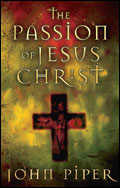
John Piper
Reviewed by: Rob Broline
The Passion of Jesus Christ, by John Piper. Published by Crossway Books, 2004. Paperback, 128 pages, list price $7.99. Reviewed by OP pastor Rob Broline.
The subtitle to this book (" 50 Reasons Why He Came to Die") reveals not only the content of the book, but the structure as well. Pointing to specific Bible texts, Piper gives fifty reasons for the Passion - the suffering and death of Christ. Following his introduction, Piper's book is divided into fifty pithy chapters corresponding to the fifty reasons. Each chapter lists one or more Scripture texts, followed by one or two pages of exposition. This simple and regular format makes the book more attractive for people in our time-crunched culture. Along with the publicity of Mel Gibson's film of a similar name, this might explain why the book has sold over 1.7 million copies since its release in January.
The Scriptures and our confessional standards actually articulate one reason for Christ's death: to "save his people from their sins (Matt. 1:21)." As Jesus preached, "The Son of Man came not to be served but to serve, and to give his life as a ransom for many" (Matt. 20:28). This happened in fulfillment of his heavenly Father's design and will (Isa. 53:10), as Piper himself rightly affirms (p. 11). This one reason has multiple aspects to it and has multiple effects on the elect sinner who is united to Christ by faith. The precise number of aspects and effects cannot really be determined, given the obvious overlap that exists among them, and thus Piper's number of fifty is obviously somewhat arbitrary.
Piper's fifty chapters, then, are an unpacking of the full meaning and multiple effects of the reason for Christ's passion. As such, his discussions of Christ's passion are cogently argued. They are grounded in Scripture and agreeable to our Reformed confessional standards.
Beyond this, the greatest contribution of Piper's treatment of Christ's passion is his recognition of its twofold significance: "pardon and pattern." Many Reformed Christians understand the atoning significance (Christ as our substitute), but miss the conforming significance (Christ as our example). The passion (and resurrection) of Christ not only pardons the believer's sins, but also provides the pattern and power for his new obedience in Christ: "However, this unique suffering, after pardoning and justifying sinners, transforms them into people who act like Jesus - not like him in pardoning, but like him in loving. Like him in suffering to do good for others. Like him in not returning evil for evil. Like him in lowliness and meekness. Like him in patient endurance. Like him in servanthood, Jesus suffered for us uniquely, that we might suffer with him in the cause of love" (p. 93).
There are a few sections in this book that give one pause. For instance, Piper's admittedly speculative equating of the passion of Christ with what he calls the "passion of Auschwitz" (pp.14-15)is puzzling. Also, the narrow scope of the book does not allow Piper to do full justice to the importance of the death and resurrection of Christ, particularly in light of the numerous New Testament passages which teach that the believer's Spirit-wrought union is with Christ in his death and resurrection.
June 29, 2025
June 22, 2025
June 15, 2025
June 08, 2025
June 01, 2025
Anxiety: Finding the Better Story
May 25, 2025
April 27, 2025
The Devoted Mind: Seeking God’s Face in a World of Distraction
© 2025 The Orthodox Presbyterian Church